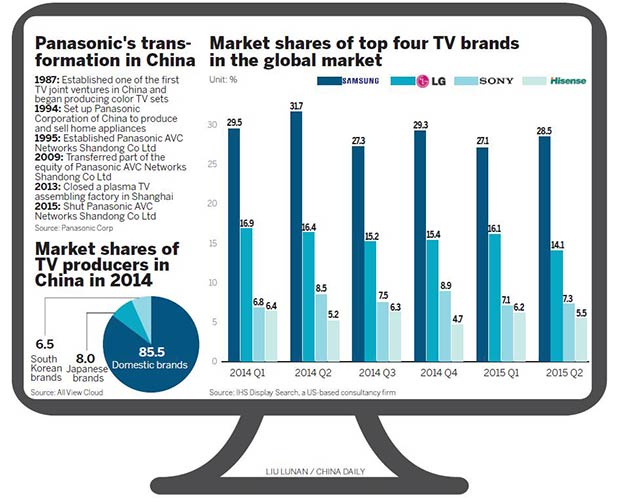
"Our aim is to connect different smart home appliances and create intelligent indoor spaces for families, communities and towns," said Yamauchi.
Like Panasonic, Sony Corp is chasing a revival in China. Ever since Kazuo Hirai's appointment as president and CEO in 2012, the company has been restructuring itself. It sold its Vaio computer business and spun off its TV division. "Profit from the electronics business, except the mobile phones, has improved as a result of the restructuring," said Hirai.
In 2014, revenue was about $68.47 billion, up 5.8 percent year-on-year, and operating profit was $571 million. Its TV business, now with focus on high-end models, posted its first profit in 11 years.
"We will increase sales of high-end products to ensure profits. We will focus on the post-1980 and post-1990 generations and middle-class users and cultivate new businesses with unique technologies," said Nobuki Kurita, president of Sony China Co Ltd.
For Sony, the Chinese market is a priority alongside the US, he said. Sony now has three key businesses in China, including consumer electronics, specialized business solutions and devices, said Kurita.
In consumer electronics, Sony's focus is on value-added products like high-resolution, extremely slim television sets, and imaging products and solutions, including specialized broadcasting audio equipment, projectors, digital cinema and B2B business involving medical and telecommunication equipment, Kurita said.
Last year, Sony launched the Seed Acceleration Program, a startup incubator that seeks to fast-track promising new business ideas. The program has already spawned startups for smart locks, smart wristbands and smartwatches.
The Japanese exit from electronics extended beyond China. Chinese TV maker Hisense acquired Sharp's TV factory in Mexico and its television business for the North and South American markets.
Elsewhere, faced with huge losses, Toshiba Corp exited TV production and decided to focus on construction, nuclear power and infrastructure and other B2B businesses.
Japanese giants' efforts to remain relevant are a result of Chinese enterprises' newly acquired mastery in home appliance technologies and cost advantages, which hurt the former's profits, said Zhang Yanbin, assistant director of All View Cloud, a Beijing-based consultancy specializing in home appliances. The shift to other areas "is a necessity" and a "strategic adjustment", he said.
Liang Zhenpeng, an analyst of consumer electronics, said: "Japanese companies must simplify the decision-making process, improve operational efficiency and strengthen the transformation to intelligent and internet-enabled fields."
What is an 'intelligent' or smart appliance?
Smart home products are devices or appliances that can be operated, controlled and monitored using mobile phones via Internet. They use technologies like cloud computing and big data, and have the capability to be connected to other such devices.
